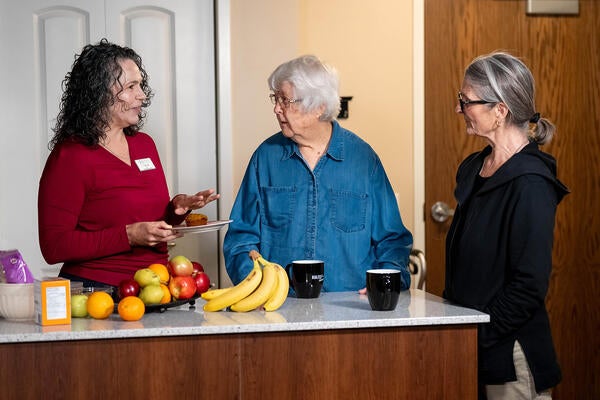
Stronger social connections may help keep dementia at bay
January is Alzheimer's Awareness Month. Schlegel Research Chair Heather Keller says social interaction in long-term care homes is key to good health.

January is Alzheimer's Awareness Month. Schlegel Research Chair Heather Keller says social interaction in long-term care homes is key to good health.
By Dave Pink Communications & Public Affairs Being part of mealtime preparations and conversations go a long way to keeping the elderly alert and involved, and possibly resistant to age-related dementia and Alzheimer’s disease, says Heather Keller, a specialist in nutrition and older adults.
Being part of mealtime preparations and conversations go a long way to keeping the elderly alert and involved, and possibly resistant to age-related dementia and Alzheimer’s disease, says Heather Keller, a specialist in nutrition and older adults.
Loneliness and isolation, on the other hand, seem to foster mental health problems.
“In a long-term care environment we see people shutting down. Our challenge is to make people more comfortable, so they see themselves as part of a group and become more resilient within their environment.”
Keller, who joined the University of Waterloo in 2012 as the Schlegel Research Chair in nutrition and aging, has assembled a team of 14 investigators in four provinces to study issues relating to the care of older adults.
“I wanted to get back into clinical research,” she says.
While significant attention should be paid to what our elderly citizens eat, Keller says, equal attention should be given to how they participate in the social interaction of the supper table.
“There is an incredible complexity to mealtimes,” she says. “It goes beyond nutrition; it’s about social identification and who we are as individuals.
“We know that among children those who eat in a family setting together with their parents do better at school and have better relations with their parents. Mealtimes are an opportunity to reduce stress, and offer each other emotional support.”
As for the older members of a family, “Surprisingly, not much research has been done on it,” she says.

Read more
The Government of Canada announces funding to support research in food policies and medical devices

Read more
How machine learning empowers collaboration between computer science, math and medical research

Read more
Dr. Heather Keller discusses the need to transform mealtimes in Canada’s long-term care homes from a service to a meaningful form of care
The University of Waterloo acknowledges that much of our work takes place on the traditional territory of the Neutral, Anishinaabeg, and Haudenosaunee peoples. Our main campus is situated on the Haldimand Tract, the land granted to the Six Nations that includes six miles on each side of the Grand River. Our active work toward reconciliation takes place across our campuses through research, learning, teaching, and community building, and is co-ordinated within the Office of Indigenous Relations.